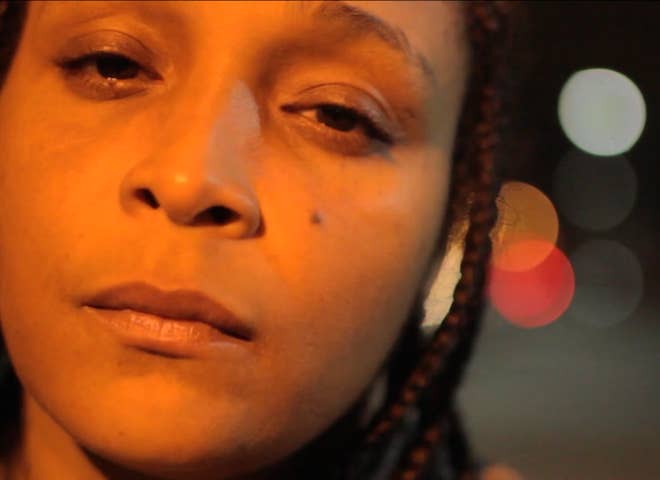
We've been here before: eight months ago, nine years ago, and 16 years ago. And multiple times prior, plus many in between. Freddie Gray is another young black man dead at the hands of law enforcement, and, as per usual, we're left with many questions and a body. We've yet to learn what could've possibly happened for a man to be left with a crushed voicebox and a nearly severed spine. The system is cruel, and we're again left to cope.
Felicia "Snoop" Pearson, whose bond with Baltimore extends well past The Wire, is one who's also coping. The Baltimore native is well aware of her city's trappings: the dilapidated houses, the lack of opportunity, and oppressive law enforcement. She took time out to speak to Complex about the Baltimore situation.
Follow Brian Josephs at @Bklyn_Rock.
Is any of this a surprise to you?
Nope. It’s not. We’re used to it. It’s just that [the police] got caught.
Would you say there’s anything specific to Baltimore that makes this case standout?
Man, it’s been going on all over the world. You got Ferguson, you got New York. It’s happening all over. We just gotta find a solution. We’ve been fighting this for so long. It’s just that now that it’s in everybody’s eye and you can’t deny it no more. It’s in plain view. If I would’ve been on camera stomping or beating somebody, I would’ve went to jail.
I’ve been reading about the rough rides police take the victims on. Have you been on those sort of rides?
You’re talking about the paddy wagon?
Yeah.
It’s no secret: I’m not a stranger to the law. I’ve been in the paddy wagon quite a few times and there definitely ain’t no seatbelt. You can go on any footage and see them locking you up—throwing you in there and shutting the two doors. And that’s it. They take you to the station.
Yeah, there are seatbelts in there but they don’t buckle you in. How can you buckle yourself in and you’re handcuffed to the back, not the front?
What bothers you most about the case?
When you see when they dragged into the paddy wagon, it looked like his leg was broke or something was wrong. And you hear on the video, "His leg broke. What is ya’ll?" So they put him in the wagon and his leg got broke. He’s handcuffed to the back—that’s plain to see—and ya’ll put him in the paddy wagon. A week later, he’s dead. C’mon man. Something ain’t right.
Every state that this is happening in. It gets worse and worse. Look at Baltimore City, they’re talking about the youth. The youth is our future. If the youth is dying and angry and upset, you have a problem on your hands. Every city — from Ferguson to wherever else — it gets worse and worse. It doesn’t make any sense. They’re tired of it. They’re the future. It could happen to them. That’s why they’re so upset.
The only thing that I don’t get is why they’re burning down our community. That’s us. That’s ours when we to go to the store. You can’t do that anymore. You can’t do that right now, you got to go up five-seven blocks to get a dutch. For real. Don’t burn our community down. That’s all we have.
Burn our stuff down and now we’re looking crazy. Nah, we’re not for that. And I don’t want us to do that.
I guess one could sympathize with the anger, but the problem is why aim it in the community.
No, I feel my people a thousand—a trillion percent. I feel 'em. But don’t burn ours down. They got old folk homes. Nah. These people don’t do nothing to us.
Many have made it a point to blame the youth for some reason.
Listen: You can’t blame the youth. You need to blame yourself.
First of all, Baltimore city took a lot of schools away, a lot of recreation centers away. There’s just nowhere to go. Baltimore is small. We don’t got nowhere to go. Where are you pushing at? You’re pushing them out in the streets and the corner. Everybody from the hood is not a criminal. They’re just less fortunate, and they’re trying to go to school and better their lives to make it to the NBA, the NFL—anything. A doctor or lawyer. Anything. But if you take away all of the schools and recreational centers, and you push them on the streets, then what are you going to get?
Are you familiar with the area Freddie Gray got arrested at?
It’s like that all over Baltimore: the same way. You got corners, you got row houses. It’s the hood.
I could imagine this case is more personal for you since it is in Baltimore.
Yeah because, first of all, I knew Freddie Gray. We wasn’t close, close friends or nothing like that. But I repeat, Baltimore is small. I stand in the club, go over and see him and whatever. It's "What’s up, yo," "Ha ha ha," this, that, and the third. That’s about it. But at the same time, it should be personal to everyone. When you see it on camera and the vision of what’s going on in that camera, that should hurt your heart—his leg dragging.
How long did you know Freddie Gray?
I can’t really put a number on it. I just walk past him and say what’s up. I never knew him as a bad guy. It wasn’t that personal, like I said, but I see him and I pass him. He’s a cool dude.
I guess what’s been hitting closer in these recent cases, for me, is that Michael Brown is about my age and Eric Garner is from my city.
It should hit you. Even though you don’t know him personally, that’s your hometown.
Martin Luther King and Malcolm X and everybody else was marching to get people rights. But we still don’t have our equal rights. If it was equal rights, police would be sitting in jail right now waiting on the arraignment or the outcome—whether they’re guilty or not. If it were you or me, we ain’t got no bail. We’re on trail to see if we’re guilty or innocent. That’s all the people want: equal rights.

